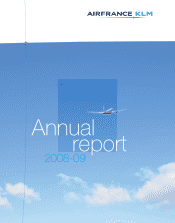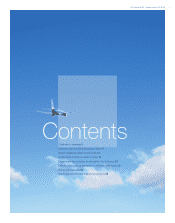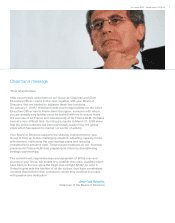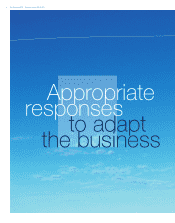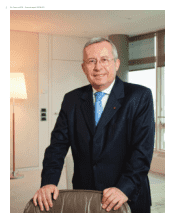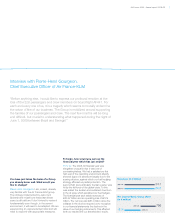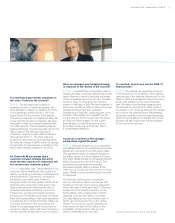Air France 2009 Annual Report Download - page 10
Download and view the complete annual report
Please find page 10 of the 2009 Air France annual report below. You can navigate through the pages in the report by either clicking on the pages listed below, or by using the keyword search tool below to find specific information within the annual report.
Have all the Group’s businesses been
affected in the same way by the crisis?
P.-H. G.: No, not all our businesses have been
affected in the same way. The cargo activity has
been the worst hit. The weakness in
international trade flows during the second half
was compounded by a situation of excess
capacity in both air transportation and shipping,
which put pressure on prices. Moreover, the
collapse in the oil price led us to withdraw many
fuel surcharges. Weak demand and lower
revenues resulted in a €207 million loss for the
cargo activity. The passenger activity was more
resilient over the year as a whole, managing to
broadly break even. However the second half
was characterized by a significant fall in
business traffic. On the other hand, our third
activity, maintenance, performed very well,
driven by the engine and components
businesses and the turnaround in the airframes
activity.
Three questions for Peter
Hartman, Chief Executive Officer
of KLM
How is the Group handling the need to
adapt headcount to the decline in
activity?
Our businesses are complex and require many
different competencies. We have implemented
a policy of flexibility aimed at reducing costs
without undermining our skill base in France
and the Netherlands. Since last year, we have
implemented a hiring freeze and reduced
recourse to temporary employees. We offer
support to those wishing to retire. Professional
mobility is being developed. These measures
enabled a 2.5% reduction in headcount at
March 31, 2009, and should allow a further 3%
reduction to March 31, 2010.
What practical steps are you taking to
replace employees who leave the
company without recruiting and to avoid
redundancies when a position is
abolished?
We strongly encourage professional mobility. At
Air France, for example, ground operations
positions are being reduced but, for the past
three years, we have offered these employees
the opportunity to become cabin crew. A
significant number have taken this up. As
another example, employees in the cargo
activity are offered vocational training before
joining the maintenance business.
At the CDG hub, around a hundred agents in
the cargo business, where activity has fallen
sharply, will move to positions occupied until
now by temporary employees. We also call on
volunteers to strengthen teams during peak
periods, such as those at the CDG hub during
the holiday season at Air France. At KLM, pilots
who are flying less are also ready to help the
ground-based teams.
We also offer attractive conditions to promote
increased part-time and teleworking. This has
two advantages in that we can respond to the
personal needs of employees while reducing
our scale.
Why have you invested in Martinair?
We have, in fact, taken full control of Martinair,
in which we previously held 50%. In this difficult
period, it means we can now rationalize the
dedicated cargo fleet.
Breakdown of operating income/(loss)
by business (in € million)
Passenger
Maintenance
Cargo
Others
8Air-France KLM - Annual report 2008-09

